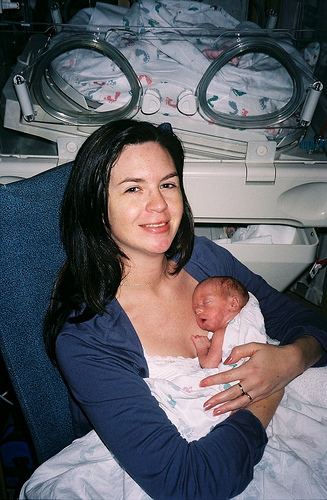Disclosure: This post may contain affiliate links, meaning we get a commission if you decide to make a purchase through our links, at no cost to you. Please read our disclosure for more info.
Any parent of a preemie knows that there’s no better feeling than finding out they are strong enough to bring home from the hospital and start their life as happy, healthy babies. But there’s also no denying that special protection for preemies continues long after they leave the NICU, and when it comes to immunizations, there are often more questions, debates, and controversies over the affects on preemies than full-term babies. The main question faced by parents – to delay, or not to delay? – boils down to several factors, as well as the comfort and preference of the preemie mother and father. Most doctors recommend a normal vaccine schedule for preemies, starting two months after they are born, however it’s always smart to know the benefits and risks.
In This Post:
1. Make your own schedule.
No matter what scare tactics you may read online or hear from friends and relatives, there is no conclusive medical evidence that there are adverse affect on premature babies from vaccines. The vast majority of preemies get their shots right on schedule and never experience side effects. However, it is important to keep in mind that your baby has a weakened immune system and a smaller weight. The best way to ensure that they don’t have any problems with their vaccines is to spread them out – avoid doing multiple shots at once, even for the healthiest preemie.
Beginning at two months old, the four most common injections given are DTap – which protects against diptheria, pertussis, and tetanus, a combined flu and Hepatitis B shot, Prevnar – which protects against meningitis, and polio. Keep in mind that Hepatitis B is not thought to be effective on babies weighing less than 4.4 pounds, so your doctor could suggest a delay in that vaccine if the preemie has not yet reached that weight. However, unless the preemie is already suffering from an infection, the others are considered completely viable.
2. Infection could be the riskier option.
A weakened immune system means a preemie is much more likely to get sick, and many parents may find that this is a far scarier prospect than immunizations. Diseases like pertussis and the flu can spread before the infected person even knows they are sick, and respiratory infections like RSV can be serious or deadly for a premature baby. The injection for RSV (respiratory syncitial virus) is called Synagis, and it is specifically given to premature babies, usually those born at less than 28 weeks gestation, born at the start of flu season, or preemies who suffer from chronic lung or congenital heart disease. Normally your baby will receive an injection once a month throughout the season to prevent this very serious infection.
If you are worried about the side effects of any vaccine, as many parents are, your pediatrician can suggest doses of Tylenol and other medicines to reduce fever or irritability. Serious side effects are extremely rare, and though immunizations are a tough decision that only you can make for your children, the risks of infections without the vaccines to protect them are undoubtedly higher for preemies.
3. Only you know your baby.
Mothers and fathers learn to recognize positive signs of development in their preemies early on, especially when it comes to feeding normally and gaining weight steadily. As your preemie gets older, you will want to monitor their health – whether it’s through sight and hearing tests, or blood and saliva tests – to be able to accurately minimize their risks for major health problems in the future. Knowing your child’s personal risks and struggles will help you make an informed decision about when or if to vaccinate.
Another thing to consider is the area in which you live. As your baby reaches one year old, you might consider when to get the MMR (measles, mumps, rubella) vaccine, and the Chickenpox vaccine called varicella. You should always consider your child’s weight and overall health, but also consider that there have been cases of measles in at least five states in 2012 already – although usually rare and isolated. Concerns about MMR and varicella stem from the fact that these are live virus vaccines and not recommended for extremely weak immune systems, but medical studies show they are safe and effective in even the earliest of preemies.
Every parent’s situation and beliefs regarding vaccinating their child is very personal, and every experience is going to be different. Many parents and medical professionals will tell you that the benefits of immunizations far outweigh the risks, but many will also suggest that you delay your preemie’s shots based on their own growth and not a universal schedule, and nobody will question you for doing what you feel is correct for your baby. If you are considering not vaccinating a child, it is always best to talk it over with a trusted doctor who can openly explain to you the factors of that decision. No matter how the pediatrician feels about immunizations, their job is to address your concerns – make the choices that are right for you and your child, and your doctor should support that.

